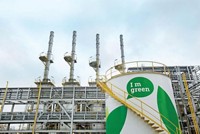Advertisement
Grab your lab coat. Let's get started
Welcome!
Welcome!
Create an account below to get 6 C&EN articles per month, receive newsletters and more - all free.
It seems this is your first time logging in online. Please enter the following information to continue.
As an ACS member you automatically get access to this site. All we need is few more details to create your reading experience.
Not you? Sign in with a different account.
Not you? Sign in with a different account.
ERROR 1
ERROR 1
ERROR 2
ERROR 2
ERROR 2
ERROR 2
ERROR 2
Password and Confirm password must match.
If you have an ACS member number, please enter it here so we can link this account to your membership. (optional)
ERROR 2
ACS values your privacy. By submitting your information, you are gaining access to C&EN and subscribing to our weekly newsletter. We use the information you provide to make your reading experience better, and we will never sell your data to third party members.
Mergers & Acquisitions
LyondellBasell dawdles on Braskem acquisition
Petrochemical maker says it would still benefit from merger with its Brazilian rival
by Alex Tullo
February 6, 2019
| A version of this story appeared in
Volume 97, Issue 6

Despite long delays, LyondellBasell Industries says it continues to pursue the possible purchase of a controlling stake in Brazilian petrochemical maker Braskem.
Lyondell announced last June that it was in discussions to buy the stake from Odebrecht, a Brazilian conglomerate that owns a 50.1% interest in Braskem. Subsequently, Brazil elected a new president, right wing populist Jair Bolsonaro, who is revamping the Brazilian government. The revamp includes the state-owned oil company Petrobras, which owns most of the rest of Braskem.
Financial analysts quizzed Lyondell CEO Bob Patel about the potential combination during a conference call on Feb. 1. “Is there a point where you need to make a decision either way and just move forward, as it has been, sorry to say, dragging on for quite a while here?” asked David Begleiter of Deutsche Bank.
“Part of the protracted timeline has been the pause because of the change in the government,” Patel answered.
During the call, Patel reiterated his belief that Braskem’s strong position in Brazilian petrochemicals would be a strategic addition for his company. Lyondell had $39 billion in sales in 2018. Braskem—a similar company that also makes basic petrochemicals, polyethylene, and polypropylene—generated $15 billion in sales in 2017.
“The outlook for Brazil continues to improve, and the expectations are positive under the new government,” Patel said. He added that Lyondell has the financial flexibility to pursue a deal even after purchasing polymer compounder A. Schulman for $2.3 billion and spending $3.4 billion on dividends and share buybacks last year.
Jorge O. Bühler-Vidal, director of Polyolefins Consulting, says Brazil’s new president could be open to Petrobras also participating in the deal, given that he has been friendly to privatization. “Petrobras wants to concentrate on oil exploration and is selling off refineries and pipelines,” he says. “Selling its share in Braskem is consistent with that objective.”




Join the conversation
Contact the reporter
Submit a Letter to the Editor for publication
Engage with us on Twitter